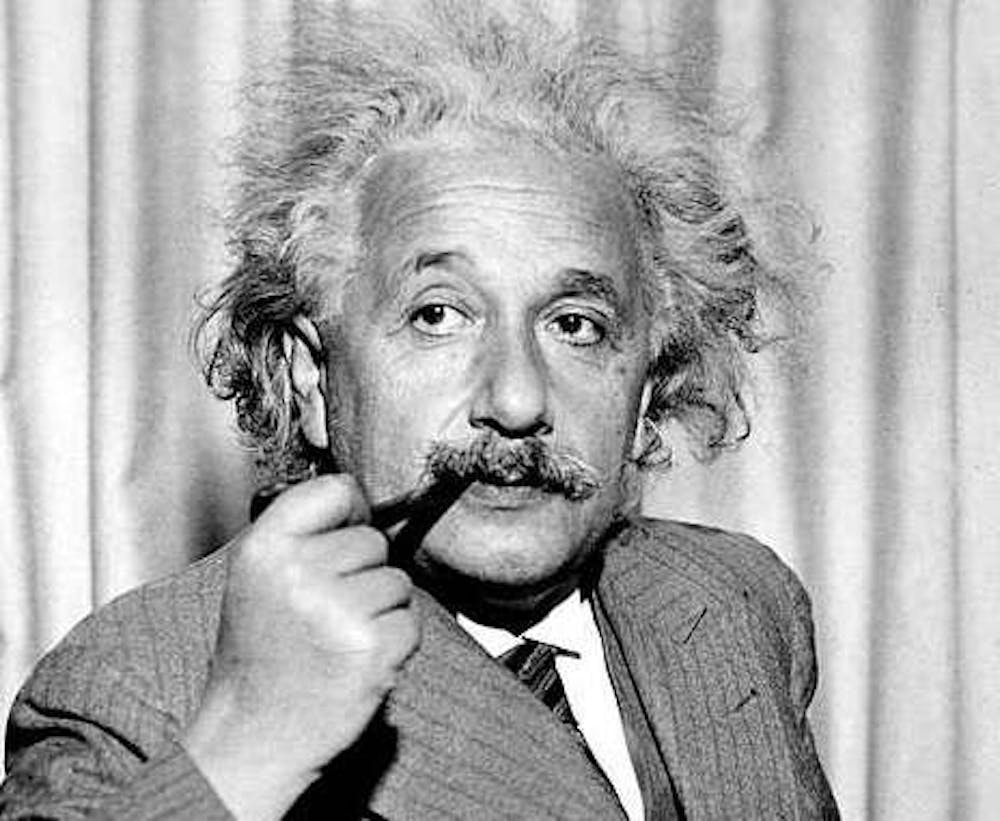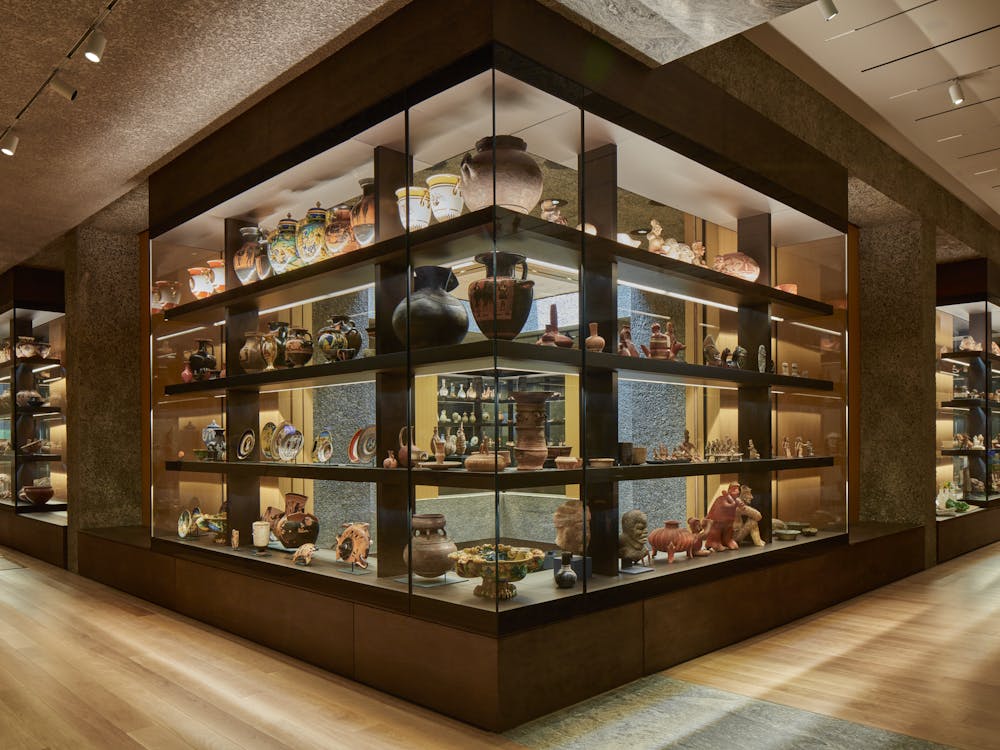Behind every great figure is a museum to preserve their legacy. The Elvis Presley Museum in Memphis. The Thomas Edison Center in North Jersey. The Albert Einstein Museum in Princeton. Well, not exactly.
Nobel Prize-winning physicist Albert Einstein grew up in Germany, ultimately immigrating to Princeton, N.J. in 1933. He became an integral part of the town: Einstein and his family bought a house on Mercer Street, and he worked at the Institute for Advanced Study until his passing in 1955. Einstein also regularly lectured at Princeton University — you may even hear student tour guides referencing his frequent lecture hall in what used to be Palmer Physical Laboratory (now home to the Frist Campus Center).
Although Einstein was revered during his life and continues to be long after his death, there was no standing museum in North America dedicated to his work and impact. That is, until a small store in Princeton accepted the charge.
The Landau family moved their wool clothing business to Princeton in 1955, after union activity in Brooklyn, N.Y. proved difficult to manage. They landed in a quaint storefront on Nassau Street. In the early 1970s, Robert and Henry Landau, after returning from college, joined their parents in the family business. As Robert Landau put it, their store, Landau, has grown into a Princeton “institution.”
In the small town of Princeton, the Landaus had the opportunity to interact with many local residents over the years, including those intimately acquainted with Albert Einstein himself. Although Einstein died the year of the Landau store opening, the Landaus grew acquainted with Einstein’s secretary who documented some of his work posthumously.
“There’s this sort of very informal and very casual link between us and Einstein,” Landau said.
This link solidified in the late 1990s when a movie about Einstein, “I.Q.,” began filming in Princeton. In a bid to take advantage of the extra traffic from the movie filming, the Landaus ran ads in local newspapers asking customers to bring era-appropriate clothing purchased from Landau that could be used in the movie’s filming.
“It was a bust,” said Landau, referring to both the movie and the attempted business project. Undeterred, the Landaus pivoted to a different publicity tactic in an effort to drum up business.
“We decided we would try to ask people to bring in their Einstein personal memorabilia. And that was like we opened the dam,” Landau added.
Princeton residents and visitors brought anything and everything Einstein. Items ranged from a wax statue of Einstein made by his daughter to an Einstein stamp collection. Many of these were never before seen.
“People just kept bringing stuff and bringing stuff and bringing stuff. And it was fascinating stuff,” Landau said. The store dedicated one window to display their ever-growing Einstein collection.
Soon, the display drew national attention. “The exhibit was sort of overwhelming and did what we had hoped it would do, which was attract a lot of attention and coverage, pretty much from the East Coast all the way to Los Angeles,” Landau said.

The small display soon garnered the attention of the Princeton Historical Society which, according to Landau, “said they had never seen a reaction to an exhibit like they had seen to our exhibit.” The Historical Society wanted to have a professionally curated Einstein exhibit with some of the materials that the Landau store had procured.
This 1995 "Einstein in Princeton" exhibition was only temporary, however. Once the exhibition concluded, Landau once again took on the charge of continuing Princeton’s Einstein legacy — this time creating a more permanent exhibit.
Landau once again answered the call. At the suggestion of Gillett Griffin, curator emeritus at the Princeton University Art Museum, and with funding from Stanley Levy ’47, the Landaus took advantage of the store’s unique six corner layout. For his part, Griffin lent them some of the Einstein memorabilia he had bought at the auction after the scientist’s death — objects such as Einstein’s pipe and the silver compass he was gifted by his mother, which reportedly played a crucial role in his early interest in science.
With this support, the Landaus ultimately relaunched the exhibit in the form of a dorm-sized “mini museum” that would come to define the store. “It became part of us,” Landau said. “I know that sounds silly, but it became more than a marketing tool.”
Landau noted that the museum was cherished by individuals ranging from visiting families to renowned mathematician John F. Nash — another famed Princeton-affiliated Nobel laureate — as a space to “spend time with Einstein.”
The mini museum sparked/spread Einstein admiration across town as well. In 2011, the Princeton Historical Society opened another exhibition dedicated to Einstein that was “extended multiple times due to its popularity,” said curator Stephanie Schwartz in an email to the ‘Prince.’ Before closing this temporary exhibition, the Historical Society began developing a permanent Einstein Salon and Innovators Gallery at the Updike Farmstead which has remained open since 2015.
With the closure of Landau upon its owners’ retirement in 2020, the museum artifacts and materials were donated to the Historical Society to continue the legacy. The Historical Society plans to use these items to supplement and expand their existing Einstein collection.
Others are answering the call as well, with efforts to establish a new Princeton Einstein Museum of Science (PEMS) already underway.
Having spent her youth in the Princeton area, PEMS founder Elizabeth Romanaux fondly recalls stories shared by her father and other community members who shared the town with Einstein.
“In my mind’s eye, I can still see Einstein in town, see him walking around doing whatever,” Romanaux said. “But I feel like, as a town, we're sort of losing that close connection as my parents’ generation dies off. My generation, we’re, you know, [sharing] secondhand stories about Einstein.”
With extensive experience in the museum industry and a deep passion for science education honed through her time at the Liberty Science Center in Jersey City, N.J., Romanaux said she hopes to showcase Einstein as “so much more than a scientist.”
“He was a humanitarian. He was an anti-racist,” she continued, in reference to his friendship with Marian Anderson and visit to HBCU Lincoln University.
“So he was publicly demonstrating the way to act, I think,” Romanaux said. “And I think these days, people could use a little dose of seeing how the most brilliant man in the world treated other people. It’s an important role model for people.”
In order to communicate these aspects of Einstein’s persona, PEMS is slated to include an entrance gallery that will provide historical context while also encouraging guests to visit other cultural sites including the Marian Anderson Museum in Philadelphia, P.A. and the Paul Robeson House in Princeton, N.J. The museum will also serve as an accessible education center for local students while creating a community gathering point with facilities aimed at encouraging visitors to explore the greater Princeton area.
Though PEMS will undoubtedly remain centered around Einstein, its approach differs from that of the Landau mini museum. Rather than displaying historical artifacts, its goal of interactivity will be expressed through features that make the physicist’s life work tangible, such as a “walk-in video immersion theater” and problem-solving exhibit.
“I think that’s another thing we could really use in this country, is having people understand how to think through a problem. So in this little museum, I’m trying to cram in a lot of stuff,” Romanaux explained.
The museum is expected to take shape at 138 Nassau Street in the space recently occupied by Triumph Brewing Company, which is set to move to a new location in Palmer Square.
“There are some Einstein museums in Europe that put me off because they’re very elaborate. And one thing Einstein was not was an elaborate, pretentious person. He was not by any means modest. But he did keep things down to the fundamentals,” said PEMS advocate Dr. James Peebles GS ’62, who is the Albert Einstein Professor of Science, Emeritus, and received the Nobel Prize in physics in 2019.
For Peebles, the Triumph Brewery space is “right and appropriate” as the venue for a museum to commemorate Einstein. “It’s a modest space for a person who — although he was by no means modest — lived a sensible, compact life,” Peebles said. “It’ll be fun.”
As part of a shared vision between Romanaux and University Chair of the Department of Art and Archaeology Rachael DeLue, the unique peaked roof of the building will enable rotating displays from celebrated painters and students alike with the purpose of interpreting Einstein’s work as art, “so that people who sort of feel like they don’t like science and don’t get it, at least come to perhaps a creative understanding of what we’re talking about,” Romanaux said.
In an interview with the ‘Prince,’ Nobel Prize-winning astrophysicist and emeritus James S. McDonell Distinguished University Professor in Physics Joseph Taylor shared his support for PEMS. As a long-time friend of Romanaux, whom he calls “the leading light of the effort,” Taylor said he encouraged her to take action on what he believes is an oversight of the town.
With the support of Princeton Mayor Mark Freda and many others in the town and the University, PEMS’s mission of continuing to share Einstein with the world is nearing reality.
For Romanaux, this effort to memorialize Einstein is in honor of both his work as a physicist and his legacy as a beloved town resident.
“I just love the fact that he was so accessible, so interested in other people, and so willing to share himself with people just as a townsperson,” she said.
For Landau, this is also a project that can unify a community. According to him, even when Einstein’s legacy in Princeton was relegated to the back corner of the wool store, people came.
“Everybody was basically interested in it … it went from 5-year-old kids to 98-year-old people. And everybody in between,” Landau said. “It seemed like everybody knew him. Everybody recognized him. And I guess that’s why 70 years after he died we’re still talking about him.”
Rachel Posner is a senior writer for the ‘Prince’ sports section who typically covers sports features. She is also a contributing writer for the Features section. She can be reached at rposner@princeton.edu.
Sejal Goud is a Features staff writer for the ‘Prince.’ She can be reached at sejalgoud@princeton.edu.
Editor’s Note: This article has been updated to more accurately reflect the efforts of the Princeton Historical Society to preserve and display artifacts from Einstein’s life. It has been specifically updated to include mention of the permanent exhibit run by the Historical Society since 2015 at the Updike Farmstead: the Einstein Salon and Innovators Gallery.








